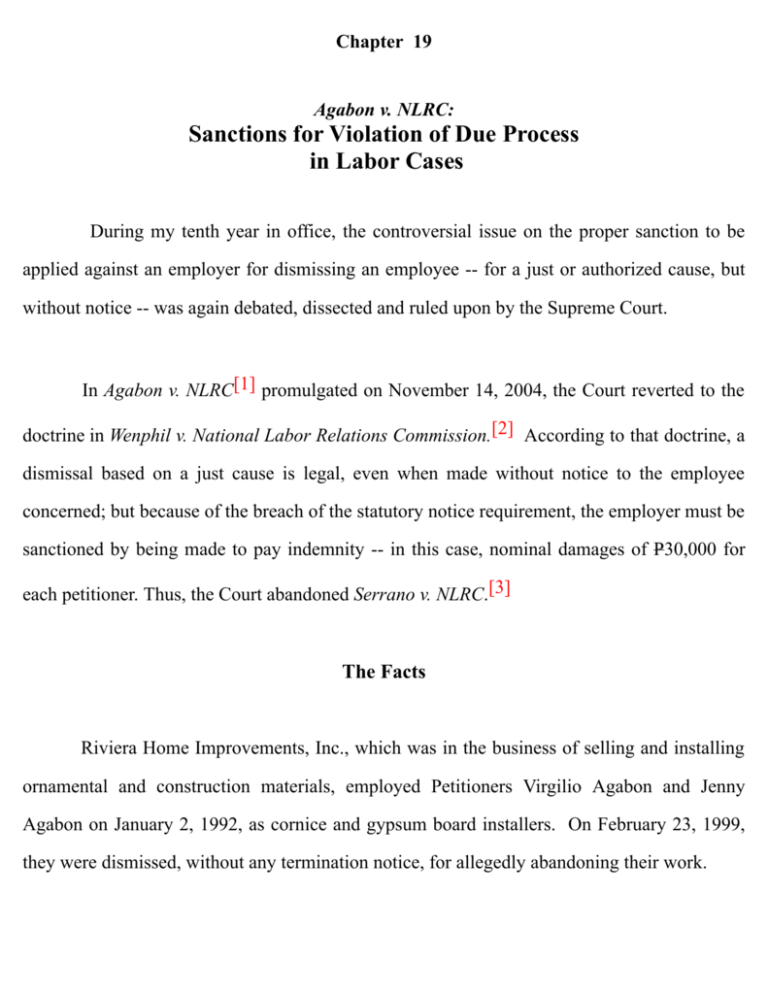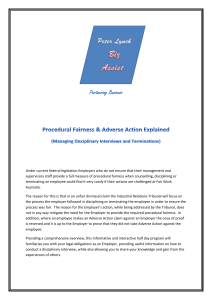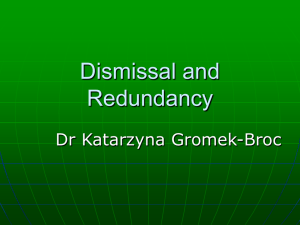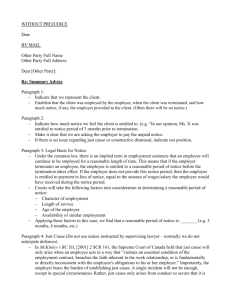Agabon v. NLRC: Sanctions for Violation of Due Process in Labor
advertisement

Chapter 19 Agabon v. NLRC: Sanctions for Violation of Due Process in Labor Cases During my tenth year in office, the controversial issue on the proper sanction to be applied against an employer for dismissing an employee -- for a just or authorized cause, but without notice -- was again debated, dissected and ruled upon by the Supreme Court. In Agabon v. NLRC[1] promulgated on November 14, 2004, the Court reverted to the doctrine in Wenphil v. National Labor Relations Commission.[2] According to that doctrine, a dismissal based on a just cause is legal, even when made without notice to the employee concerned; but because of the breach of the statutory notice requirement, the employer must be sanctioned by being made to pay indemnity -- in this case, nominal damages of P30,000 for each petitioner. Thus, the Court abandoned Serrano v. NLRC.[3] The Facts Riviera Home Improvements, Inc., which was in the business of selling and installing ornamental and construction materials, employed Petitioners Virgilio Agabon and Jenny Agabon on January 2, 1992, as cornice and gypsum board installers. On February 23, 1999, they were dismissed, without any termination notice, for allegedly abandoning their work. The Agabons sued their employer for illegal dismissal and payment of money claims. They filed the case before the labor arbiter, from whom they scored an initial victory. On appeal, however, the NLRC found that they had abandoned their work;[4] hence, they were not entitled to back wages and separation pay or to the other money claims awarded by the labor arbiter. This ruling was sustained by the Court of Appeals. The Issue The main issue before the Supreme Court was whether the petitioners were illegally dismissed. A corollary one involved the effects of the dismissal. The Court’s Ruling By a vote of 8[5] to 6[6], the Court, through Mme. Justice Consuelo Ynares-Santiago, held that there was a just cause for the termination of the employment of the petitioners, as their abandonment of work had clearly been established. However, the company did not comply with the twin-notice requirement in Book VI, Rule I, Section 2(d) of the Omnibus Rules Implementing the Labor Code.[7] This rule mandates the sending of the with notices to the last known addresses of the employees.[8] For failing to comply procedural due process, the employer in this case was directed to pay each petitioner an indemnity in the form of nominal damages of P30,000. Various Rulings on Employment Termination In its review and reexamination of relevant legal principles to clarify the various rulings on employment termination, the Court recalled that prior to 1989, a dismissal or termination had been deemed illegal for the employer’s failure to give due notice to the employee. But this long-standing rule was reversed in Wenphil in 1989. In that case it was held that the dismissed employee, although not given any notice and hearing, was not entitled to reinstatement and back wages, because the dismissal was for grave misconduct and insubordination -- a just ground for termination under Article 282 of the Labor Code. Nonetheless, for failing to give a formal notice and to conduct an investigation before dismissing the employee as required by law, the employer in Wenphil was ordered to pay the dismissed worker an indemnity of P1,000. The amount of the award, it was then stressed, should depend on the facts of each case and the gravity of the omission committed by the employer. This rule thus evolved from Wenphil: where the employer had a valid reason to dismiss an employee but did not follow the due process requirement, the dismissal may be upheld, but the employer must pay an indemnity to the employee. Wenphil was the prevailing doctrine until it was changed on January 27, 2000 by Serrano. It was held in the latter case that a violation of the notice requirement in a termination for a just or authorized cause was not a denial of due process that would nullify the termination. Rather, such violation would make the dismissal ineffectual and require the employer to pay full back wages from the time of termination until a judicial declaration that the dismissal was for a just or authorized cause. By requiring employers to pay full back wages, Serrano was intended to provide a deterrent to violations of the notice requirement better than Wenphil did. Serrano thus confronted the practice of employers who were wont to “dismiss now and pay later.” Nominal Damages for Violation of the Notice Requirement In Agabon, however, the Court held that Serrano had not considered the full meaning of Article 279[9] of the Labor Code, which provides that a termination is illegal only if it is not for any of the just or authorized causes provided by law. Consequently, the payment of back wages and other benefits, including reinstatement, is justified only if the employee was unjustly dismissed. Where the dismissal was for a just cause, as in Agabon, the Court opined that the better rule was to abandon the Serrano doctrine and to revert to Wenphil. Hence, the lack of statutory due process[10] should not nullify the dismissal or render it illegal or ineffectual. For violation of a statutory right, the employer should be sanctioned with indemnity or penalty -- this time stiffer than that in Wenphil -- so as to discourage the abhorrent “dismiss now, pay later” practice. Considering the prevailing circumstances in this case, nominal damages were fixed at P30,000 for each petitioner. The Separate Opinions The Puno Dissent Justice Reynato S. Puno stressed that “[t]here are enduring reasons for resisting Wenphil, its clone Serrano, and now their offspring Agabon.” He said that the ponencia simply retained, if not diminished, the indemnity granted to the dismissed employees. By treating an employee’s right to due process as no more than an abstract declaration, it disregards the following precepts: 1. A social justice provision was enshrined in the 1935 Constitution,[11] the 1973 Constitution,[12] and now the 1987 Constitution.[13] 2. Courts are mandated at all times to give meaning and substance to constitutional postulates in favor of the workingman. The substantive rights of workers are not to be weakened by a diminished procedural right. 3. The Constitution prescribes that employees be on equal footing with their employers. Thus, “[a]s between an employee, usually poor and unlettered, and the employer, who has resources to secure able legal advice, the law has reason to demand from the latter stricter compliance.” 4. A doctrine adhered to in a ceaseless stream of cases holds that violations of the notice requirement in labor cases constitute constitutional due process infringements, even if such cases involve private action[14] 5. In conformity with the protection accorded by the Constitution to labor is the principle that an employee who is denied procedural due process is entitled to reinstatement, the one main relief in cases of dismissal without notice and hearing.[15] 6. Compliance with procedural due process is not a burden on employers. The rules simply require an employer to give two notices: (1) a notice before dismissal apprising the employee being dismissed of the particular acts or omissions for the dismissal; and (2) a subsequent notice informing the employee of the decision of the employer to dismiss the former. 7. In the hierarchy of employees’ rights, the right to security of tenure is high, if not the highest. The paramount value of that right is recognized and guaranteed under the 1987 Constitution. The other complementary rights are meaningless to an unemployed worker. 8. Workers need work more than anything else. All persons have the right to work, to a chance to develop their qualities and their personality in the exercise of their profession, to equitable remuneration that will enable them and their families to lead a worthy life on material, social, cultural and spiritual levels. 9. Simply to allow payment of nominal damages for a violation of an employee’s right to due process is to give undue advantage to the employer. The deprivation of the right to security of tenure and to due process is beyond monetary valuation. In closing, Justice Puno explained as follows: “In these times when our lowly workers can hardly maintain body and soul together due to their meager means, I find it hard to believe that the majority in Wenphil, in Serrano, and now in the instant case Agabon, persists in weakening our employee's right to job security. The stance simply offends a basic principle of justice so entrenched in our tradition and etched in our conscience. An employee may not have a torrens title to his job but it is not too much to require that before he is dismissed by his employer, he should be given a simple notice of the cause of his dismissal and a summary hearing to present his side. All our constitutional and statutory precepts on social justice and the protection of labor will go to naught if we perpetuate our ruling that a dismissal without the required prior notice is valid and if we just penalize with the payment of pennies violations of the employee's right to due process. Without doubt, Wenphil and Serrano have lengthened the queue of the unemployed. Agabon will stretch it out even more.” My Dissent I strongly opposed the Court’s “inexplicable turnaround” or reversion to the Wenphil doctrine, saying it was a setback to labor’s rights; it also diminished respect for due process. I restated my consistent position:[16] illegal dismissal results not only from the absence of a just or authorized cause as provided in the Labor Code, but likewise from the failure to observe due process.[17] Maintaining the grounds upon which I dissented in Serrano, I argued thus: “x x x [W]hen an employee is dismissed without due process, the legal effect is an illegal dismissal; and the appropriate sanction is full back wages plus reinstatement, not merely full back wages (or separation pay), much less merely “indemnity of one month salary for every year of service.” It is jurisprudentially settled that when procedural due process is violated, the proceedings -- in this case, the dismissal -- shall be voided, and the parties returned to their status quo ante; that is, the employees should be given back their old jobs and paid all benefits as if they have never been dismissed.” The only exception to the above sanctions, I said, would be a case analogous to Wenphil, one clearly showing the impracticality and the futility of observing the procedure laid down by law in terminating employment. Under such circumstances, dismissal would not be illegal, and no award could properly be granted. Nevertheless, as a measure of compassion, the employee may be given a nominal sum depending on the circumstances, pursuant to Article 2221 of the Civil Code. I concluded with these words: “In the final analysis, what is involved here is not simply the amount of monetary award -- whether insignificant or substantial; whether termed as indemnity, penalty, separation pay or full back wages. Neither is the subject here merely a matter of respect for workers’ rights or adequate protection of labor. The bottom line is the constitutionally granted right to due process, which is the very essence of justice itself. Where the rule of law is the bedrock of our free society, justice is its very lifeblood. A denial of due process is thus no less than a denial of justice itself.” The Tinga Opinion In a Separate Opinion, Justice Dante O. Tinga concurred in the result of the majority Decision, which “emphatically reaffirms the rule that dismissals for just cause are not invalidated due to the failure of the employer to observe the proper notice and hearing requirements under the Labor Code.” The Decision, he said, likewise established the Civil Code provisions on damages as the proper framework for granting relief in those cases in which the employee was dismissed for a just cause but did not receive the required notices. Believing that violations of the notice requirement in labor termination cases were breaches merely of statutory due process rather than constitutional due process,[18] he pointed out the following: 1. “[T]he Court, prior to the enactment of the Labor Code, was ill-receptive to the notion that termination for just cause without notice or hearing violated the constitutional right to due process though it recognized an award of damages as the appropriate remedy.[19]” 2. “[T]he Labor Code, in its inception, did not require notice or hearing before an employer could terminate an employee for just cause.”[20] 3. “It is quite apparent that the constitutional protection of labor was entrenched more than eight decades ago, yet such did not prevent this Court in the past from affirming dismissals for just cause without valid notice. Nor was there any pretense made that this constitutional maxim afforded a laborer a positive right against dismissal for just cause on the ground of lack of valid prior notice.” 4. “The necessity for laws concretizing the constitutional principles on the protection of labor is evident in the reliance placed upon such laws by the Court in resolving the issue of the validity of a worker’s dismissal. In cases where that was the issue confronting the Court, it consistently recognized the constitutional right to security of tenure and employed the standards laid down by prevailing laws in determining whether such right was violated. The Court’s reference to laws other than the Constitution in resolving the issue of dismissal is an implicit acknowledgment that the right to security of tenure, while recognized in the Constitution, cannot be implemented uniformly absent a law prescribing concrete standards for its enforcement.” 5. “There is no express provision in the Labor Code that voids a dismissal for just cause on the ground that there was no notice or hearing. Under Section 279, the employer is precluded from dismissing an employee except for a just cause as provided in Section 282, or an authorized cause under Sections 283 and 284. Based on reading Section 279 alone, the existence of just cause by itself is sufficient to validate the termination.” He thus posited that the failure to substantially comply with the standards of due process, including the notice and hearing requirement, could give rise to an actionable claim against the employer. The remedy of reinstatement despite termination for a just cause was, however, simply not authorized by the Labor Code. He explained thus: “x x x [T]he practical purpose of requiring notice and hearing is to afford the employee the opportunity to dispute the contention that there was just cause in the dismissal. Yet it must be understood – if a dismissed employee is deprived of the right to notice and hearing, and thus denied the opportunity to present countervailing evidence that disputes the finding of just cause, reinstatement will be valid not because the notice and hearing requirement was not observed, but because there was no just cause in the dismissal. The opportunity to dispute the finding of the just cause is readily available before the Labor Arbiter, and the subsequent levels of appellate review.” On the issue of damages to be awarded to the employee dismissed without notice, Justice Tinga argued that the award of damages must have a statutory basis: the Civil Code. Reviewing the provisions of the Labor Code, he pointed out that Article 279 of the Code clearly authorized the payment of back wages only if an employee had been unjustly dismissed. Separation pay could not be ordered either, based on the Labor Code provision for the termination of employment for a just cause. Separation pay is warranted only for dismissal for an authorized cause, as enumerated in Articles 283 and 284 of the Labor Code. Justice Tinga observed that while, as a measure of social justice, the Court had authorized in the past the award of separation pay for duly terminated services, it had done so on the condition that the employee was not guilty of any serious misconduct reflecting on moral character. Nonetheless, he added, such an award had no statutory basis, but clearly emanated from the Court’s so-called “equity jurisdiction.” Liability for failure to render the notice requirement comes from another putative source -- the Labor Code -- specifically Article 288,[21] which should likewise be rejected. This particular provision explicitly states that the imposition of a fine or an imprisonment is at the “discretion of the court.” Thus, before Article 288 can be applied, a criminal case has to be instituted before the proper courts, and the subject Labor Code violation duly proven in an adversarial proceeding. It is also clear that the provision comes into play regardless of who the violator may be -- the employer, the employee, or even officials tasked with implementing the Labor Code. Moreover, it was contended that the penalty under Article 288 should be paid to the State, not to the person or persons who may have suffered injury as a result of the violation. Since it penalizes a Labor Code violation that causes no actual injury to any person, this provision clearly serves as a punitive fine rather than as a compensatory measure, For the foregoing reasons, Justice Tinga maintained that Serrano and a few other cases, which adverted to “fines” paid to the dismissed employee, may have left an erroneous impression that the award implemented beginning with Wenphil was based on Article 288. Yet, an examination of Wenphil reveals that what the Court actually awarded to the employee was an “indemnity” that depended on the facts of each case and the gravity of the omission committed by the employer. The proper legal basis, then, for holding the employer liable for monetary damages to the employee who was dismissed for a just cause is the Civil Code. It is the law that regulates the private relations of the members of civil society, as it determines their respective rights and obligations with reference to persons, things, and civil acts. No matter how impressed with public interest the relationship between a private employer and employee is, it is still ultimately a relationship between private individuals, said Justice Tinga. The award of damages should be measured against the loss or injury suffered by the employee by reason of the employer’s violation; or, in case of nominal damages, against the right vindicated by the award. This is the proper paradigm authorized by our law and designed to obtain the fairest possible relief. Insofar as just dismissals without notice were concerned, Justice Tinga proposed the following standards to guide the proper award of damages under the Civil Code. First. As a general rule, failure to comply with the statutory requirement of notice automatically gives rise to nominal damages at the very least, even if the dismissal was sustained for a just cause. Nominal damages are adjudicated, so that a plaintiff’s right that has been violated or invaded by another may be vindicated or recognized without having to indemnify the plaintiff for any loss suffered. Such damages may likewise be awarded in every obligation arising from law, contracts, quasi-contracts, acts or omissions punished by law, and quasi-delicts; or when any property right (such as one’s employment, profession, trade or calling) has been invaded. Factors such as length of service, positions held, and salary received may be considered to obtain a proper measure of nominal damages. At the same time, it should be recognized that nominal damages are not meant to be compensatory, and that the amount should not be computed through a formula based on actual losses. Consequently, nominal damages are usually limited in pecuniary value. Second. Actual or compensatory damages are not available, as a matter of right, to an employee dismissed for a just cause but denied statutory due process. They must be based on clear factual and legal bases and must correspond to the duly proven pecuniary loss suffered by the employee. Third. If there is a finding of pecuniary loss arising from the employer’s violation, but the amount cannot be proved with certainty, then temperate or moderate damages are available under Article 2224 of the Civil Code. Again, sufficient discretion is afforded to the adjudicator as regards the proper award, which must be reasonable under the circumstances. Temperate or nominal damages may yet prove to be a plausible remedy, especially when common sense dictates that pecuniary loss was suffered, but was incapable of precise definition. Fourth. Moral and exemplary damages may also be awarded in the appropriate circumstances. As pointed out in the ponencia, moral damages are recoverable if the dismissal of the employee was attended by bad faith or fraud; or if the dismissal was done in a manner contrary to morals, good customs or public policy; or if the employer committed an act oppressive to labor. Exemplary damages are those awarded if the dismissal was effected in a wanton, oppressive or malevolent manner. [1] [2] [3] [4] [5] [6] [7] 442 SCRA 573, November 14, 2004, per Ynares-Santiago, J. 170 SCRA 69, February 8, 1989, per Gancayco, J. 380 Phil. 416, January 27, 2000, per Mendoza, J. Abandonment was considered as a form of neglect of duty, one of the just causes for dismissal under Article 282 of the Labor Code. This provision enumerates the just causes as follows: “(a) serious misconduct or willful disobedience by the employee of the lawful orders of his employer or the latter’s representative in connection with the employee’s work; (b) gross and habitual neglect by the employee of his duties; (c) fraud or willful breach by the employee of the trust reposed in him by his employer or his duly authorized representative; (d) commission of a crime or offense by the employee against the person of his employer or any immediate member of his family or his duly authorized representative; and (e) other causes analogous to the foregoing.” The ponencia penned by Justice Consuelo Ynares-Santiago was concurred in by Justices Leonardo A. Quisumbing, Antonio T. Carpio, Ma. Alicia Austria-Martinez (in the result), Conchita Carpio Morales, Romeo J. Callejo Sr., Adolfo S. Azcuna, and Dante O Tinga (in the result). The six justices who dissented were Chief Justice Hilario G. Davide Jr.; and Justices Reynato S. Puno, Artemio V. Panganiban, Angelina Sandoval-Gutierrez, Minita V. Chico-Nazario and Cancio C. Garcia. Justice Renato C. Corona was on leave. The Rule pertinently provides thus: “Standards of due process: requirements of notice. – In all cases of termination of employment, the following standards of due process shall be substantially observed: “I. For termination of employment based on just causes as defined in Article 282 of the Code: “(a) A written notice served on the employee specifying the ground or grounds for termination, and giving to said employee reasonable opportunity within which to explain his side; “(b) A hearing or conference during which the employee concerned, with the assistance of counsel if the employee so desires, is given opportunity to respond to the charge, [8] [9] [10] present his evidence or rebut the evidence presented against him; and “(c) A written notice of termination served on the employee indicating that upon due consideration of all the circumstances, grounds have been established to justify his termination. “In case of termination, the foregoing notices shall be served on the employee’s last known address. (Emphasis supplied)8 The excuse given by the employer was that it saw no practical use for sending the notices to the last known addresses of the petitioners. The excuse was not accepted by the Court, which said that the notices should have nevertheless been sent. The Article reads as follows: “ART. 279. Security of Tenure. – In cases of regular employment, the employer shall not terminate the services of an employee except for a just cause or when authorized by this Title. An employee who is unjustly dismissed from work shall be entitled to reinstatement without loss of seniority rights and other privileges and to his full backwages, inclusive of allowances, and to his other benefits or their monetary equivalent computed from the time his compensation was withheld from him up to the time of his actual reinstatement.” The ponencia stressed that a breach of the Labor Code’s due process requirements in termination of employment cases did not constitute a violation of constitutional due process, but merely of statutory due process. It said: “Constitutional due process protects the individual from the government and assures him of his rights in criminal, civil or administrative proceedings; while statutory due process found in the Labor Code and Implementing Rules protects employees from being unjustly terminated without just cause after notice and hearing.” [11] [12] [13] [14] Article II (Declaration of Principles), Section 5 of the 1935 Constitution, provides that “[t]he promotion of social justice to insure the well-being and economic security of all the people should be the concern of the State.” Article II (Declaration of Principles and State Policies), Section 6 of the 1973 Constitution, provides that “[t]he State shall promote social justice to ensure the dignity, welfare, and security of all the people. Towards this end, the State shall regulate the acquisition, ownership, use, enjoyment, and disposition of private property, and equitably diffuse property ownership and profits.” Section 9 also states that “[t]he State shall afford protection to labor, promote full employment, ensure equal work opportunities regardless of sex, race or creed, and regulate the relations between workers and employers. The State shall assure the rights of workers to self-organization, collective bargaining, security of tenure, and just and humane conditions of work. The State may provide for compulsory arbitration.” Article XIII of the 1987 Constitution is devoted to Social Justice and Human Rights, with a full section on labor (Section 3). The cases cited were as follows: 1. Batangas Laguna Tayabas Bus Co. v. Court of Appeals (GR L-38482, 71 SCRA 470, June 18, 1976), in which the Court held that “the failure of petitioner to give the private respondent the benefit of a hearing before he was dismissed constitutes an infringement on his constitutional right to due process of law.” 2. De Leon v. National Labor Relations Commission (GR No. 54996, 109 SCRA 489, November 27, 1981), in which an employee was dismissed without notice. It was held that “[t]here is in this case a clear denial of due process, a constitutional right which must be safeguarded at all times especially when what is at stake is petitioner's position as his only means of livelihood.” 3. Kwikway Engineering Works v. National Labor Relations Commission (GR No. 85014, 195 SCRA 526, March 22, 1991), which ruled that “[t]he twin requirements of notice and hearing constitute essential elements of due process in cases of employee dismissal: the requirement of notice is intended to inform the employee concerned of the employer’s intent to dismiss and the reason for the proposed dismissal; upon the other hand, the requirement of hearing affords the employee an opportunity to answer his employer’s charges against him accordingly and to defend himself therefrom before dismissal is effected. Neither of these two requirements can be dispensed with without running afoul of the due process requirement of the 1987 Constitution.” [15] [16] [17] Justice Puno stressed thus: “This Court, in carrying out the constitutional directive of the 1973 Constitution requiring the State to ‘assure the rights of workers to x x x security of tenure x x x has quite consistently nullified, simply on constitutional grounds, dismissals in violation of procedural due process, notwithstanding the absence of an express provision of any statute. The Court has done the same under the 1987 Constitution which admittedly has given more protection to labor than any of the previous charters x x x.” Beginning with my ponencia in MGG Marine Services v. NLRC (328 Phil. 1046, July 29, 1996, at FN 18), I have vehemently and continuously objected to the “indemnity only” rule laid down by Wenphil, which to me showed the low regard for due process. I also dissented quite lengthily in Better Buildings v. NLRC (347 Phil. 521, December 15, 1997, per Romero, J.), believing that a dismissal that had violated due process should be deemed illegal and sanctioned with stiffer penalties, such as separation pay plus indemnity. This view was reiterated in Del Val v. NLRC (357 Phil. 286, September 25, 1998, per Quisumbing, J.) and Serrano. A whole chapter, “Battles over the Rights of Labor,” in my book Battles in the Supreme Court (1998), is devoted to a discussion of my views and dissent in Better Buildings. Meanwhile, I have written about Serrano in Chapter 17 of my book entitled Transparency, Unanimity & Diversity (2000). Again, I dissented from the view that a violation of the notice requirement entailed merely a breach of statutory, not of constitutional, due process. I argued thus: “An objective reading of the Bill of Rights clearly shows that the due process protection is not limited to government action alone. The Constitution does not say that the right cannot be claimed against private individuals and entities. Indeed, the employee is entitled to due process, not because of the Labor Code, but because of the Constitution. Elementary is the doctrine that constitutional provisions are deemed written into every statute, contract or undertaking. “True, traditional doctrine holds that constitutional rights may be invoked only against the State, which in the past was the only entity in a position to violate these rights, including the due process clause. However, with the advent of liberalization, deregulation and privatization, the State tended to cede some of its powers to the ‘market forces.’ Hence, corporate behemoths and even individuals may now be sources of abuses and threats to human rights and liberties. I believe, therefore, that this traditional doctrine should be modified to enable the judiciary to cope with new paradigms and to continue protecting the people from new forms of abuses.” [18] For Justice Tinga, “the Bill of Rights affords protection against possible State oppression against its citizens, but not against an unjust or repressive conduct by a private party towards another.” He argued that “[e]mployers plainly do not possess the awesome powers and the tremendous resources which the State has at its command.” [19] In support of his view, Justice Tinga cited the cases Phil. Refining Co. v. Garcia, (124 Phil. 698, September 27,1966, per Reyes, J.) and Galsim v. PNB (139 Phil. 747, August 29,1969, per Sanchez, J.) Reference was made to Serrano, in which Justice Vicente V. Mendoza gave a historical review, which reads: “Where the termination of employment was for a just cause, no notice was [20] required to be given to the employee. It was only on September 4, 1981 that notice was required to be given even where the dismissal or termination of an employee was for cause. This was made in the rules issued by the then Minister of Labor and Employment to implement B.P. Blg. 130 which amended the Labor Code. And it was still much later when the notice requirement was embodied in the law with the amendment of Art. 277(b) by R.A. No. 6715 on March 2, 1989.” [21] The Article provides as follows: “Penalties. — Except as otherwise provided in this Code, or unless the acts complained of hinges on a question of interpretation or implementation of ambiguous provisions of an existing collective bargaining agreement, any violation of the provisions of this Code declared to be unlawful or penal in nature shall be punished with a fine of not less than One Thousand Pesos (P1,000.00) nor more than Ten Thousand Pesos (P10,000.00), or imprisonment of not less than three months nor more than three years, or both such fine and imprisonment at the discretion of the court.”





